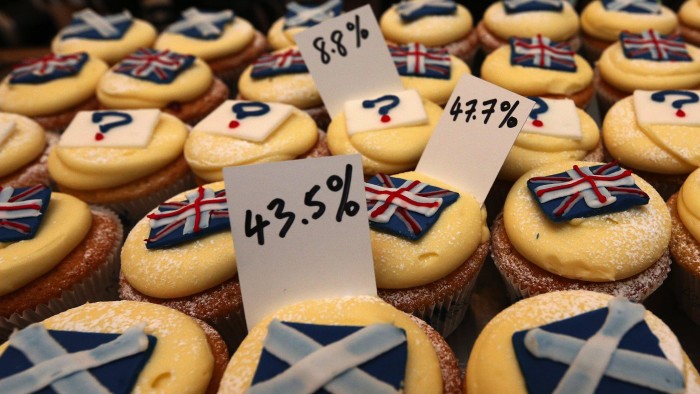Border businesses fear Scots Yes vote

Roula Khalaf, Editor of the FT, selects her favourite stories in this weekly newsletter.
For businesses based in the far north of England, the nearby border with Scotland is simply a line on the map noticed only by tourists posing beside the Fàilte gu Alba – Welcome to Scotland – signs.
Suddenly, however, with the outcome of Thursday’s independence vote looking very close, everything seems uncertain.
“It’s that vague, you don’t know what to worry about,” says Bill Parkin, co-founder and managing director of England’s most northerly engineering company, SWP, based just north of Berwick. “There’s concern, but nobody has a clue what will happen.”
At a recent debate hosted by the Institute of Directors in Carlisle, just 10 miles south of the western side of the Anglo-Scottish boundary, the future of the pound and possible controls on movement of people, animals and goods were the biggest concerns of businesses on both sides. Fergus Ewing, the Scottish enterprise minister, insisted there would be no “Checkpoint Charlie”, a reference to divided cold war Berlin. “The border posts and barriers are gone; we are for the promotion of trade.”
However, Sir Alan Beith, the Liberal Democrat MP for Berwick, writing in the Berwick Advertiser newspaper, warned that controls would be necessary “if one of our two nations was in the EU and the other was not”. They could also be necessary, he added, if the UK government had no confidence in the Scottish government’s immigration or security policy.
Some businesses in Berwick, on the east coast just two miles from Scotland, derive most of their work north of the border. Constantly crossing it for work, shopping and recreation, people in the town struggle to believe there could be actual barriers. But they are taking very seriously the possibility that Scotland could have a different currency.
And Gavin Jones, co-founder of Jones and Jones, a Berwick-based tea and coffee hamper retailer, says: “The only people who make money out of currency exchanges are the banks.”
At present around 40 per cent of the takings in his till are in Scottish bank notes. His local customers are both English and Scottish, so too are his suppliers. He worries about the possibility of added cost and complexity if Scotland becomes independent. “Borders are barriers,” he says.
In depth

Scotland will decide in a referendum to be held on September 18 whether or not to end the 307-year-old union with England
Further reading
In Carlisle, Mr Ewing repeated Scottish offers to set up a cross-border economic forum and promote a high speed rail link with northern England. However, John Stevenson, Tory MP for Carlisle, said it would turn Scots who cross the border to work and trade from “colleagues” into “competitors in the global race”.
David Hymers, managing director of Cumbria-based TotalPost, which scans mail and makes franking machines, fears Scotland could lure businesses across the border with lower tax rates and prioritise domestic companies over English competitors. His company has contracts with the Scottish parliament and police. He said he was confident of keeping them, but added: “I would like the status quo to continue.”
And Neil McNicholas, managing director of Direct Rail Services, feared for cross-border trade. DRS handles freight for Asda and Tesco and for every three wagons it sends north, two return empty. “If the Scottish economy weakened and the ratio fell below 3:1, the service would not be viable,” he said.
At Maden Eco, Mr Maden has had people from Edinburgh and Aberdeen inquiring about a Berwick apartment scheme he is developing, saying they want to move south if Scotland votes for independence. But, for the sake of people both sides of the border, he still hopes the result is No. “It’s just too risky.”
Comments